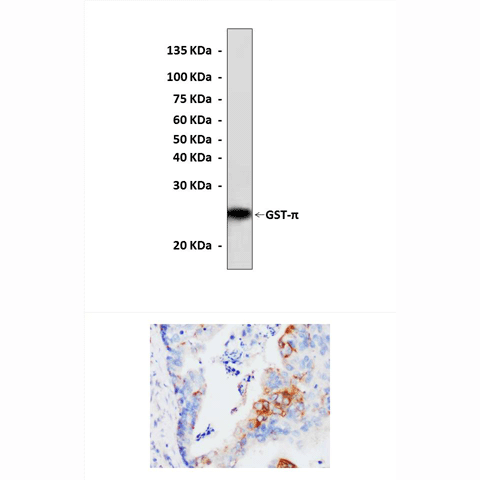Anti-GST-π: Rabbit Glutathione S-Transferase Pi Antibody
Rabbit Glutathione S-Transferase Pi Antibody: Rabbit Glutathione S-Transferase Pi Antibody
Size: 100 ul
Price: $375.00
Description
Epidemiology and experimental models indicate that several neurological disorders, including idiopathic Parkinson’s disease (PD), arise from the combination of a genetic susceptibility and environmental exposure to compounds that generate oxidative stress. Brains of PD patients show numerous indicators of oxidative stress, including decreased levels of glutathione (GSH), increased lipid peroxidation, presence of dopamine quinones, DNA damage, and increases in JNK-mediated activation of c-Jun. GST-Pi is the only GST family member expressed in substantia nigra neurons. Differential expression of GST-Pi contributes to the sensitivity to xenobiotics in the substantia nigra and may influence the pathogenesis of reactive oxygen species-induced neurological disorders including PD.3
2. Gate, L. et al; J. Biol. Chem. 279:8608-16, 2004
3. Smeyne, M. et al: Proc. Natl. Acad. Sci. USA 104:1977-82, 2007
Details
| Cat.No.: | CA1040 |
| Antigen: | Short peptide from human GST-Pi sequence. |
| Isotype: | Rabbit IgG |
| Species & predicted species cross- reactivity ( ): | Human, Rat |
| Applications & Suggested starting dilutions:* | WB 1:1000 IP n/d IHC 1:50 – 1:200 ICC n/d FACS n/d |
| Predicted Molecular Weight of protein: | 26 kDa |
| Specificity/Sensitivity: | Detects endogenous levels of GST-Pi proteins without cross-reactivity with other related proteins. |
| Storage: | Store at -20°C, 4°C for frequent use. Avoid repeated freeze-thaw cycles. |
*Optimal working dilutions must be determined by end user.
